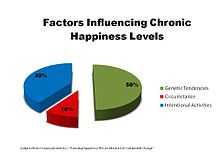Sonja Lyubomirsky
Sonja Lyubomirsky is a professor in the Department of Psychology at the University of California, Riverside and author of The How of Happiness, a book of strategies backed by scientific research that can be used to increase happiness.[1]
She is often quoted in news articles about positive psychology and happiness.[2][3][4] In the book The Only Self-Help Book You'll Ever Need, a criticism of self-help books, Lyubomirsky's The How of Happiness is praised as a self-help book that has claims backed by empirical data.[5]
She is also an associate editor of the Journal of Positive Psychology.
The How of Happiness

The premise of The How of Happiness is (1) that happiness is worth striving for, and (2) that 50 percent of a given human's happiness level is genetically determined (based on twin studies),[6] 10 percent is affected by life circumstances and situation, and a remaining 40 percent of happiness is subject to self control.[7][8][9] The strategies offered in the book are designed to target the 40 percent of happiness that is subject to manipulation.
The How of Happiness has spawned an iPhone application called Live Happy, produced by Signal Patterns. Lyubomirsky is on the company's scientific advisory board.[10]
The How of Happiness has also spawned a song called The How of Happiness Book Tune, which acts as a mnemonic aid to help readers remember the content within the book. [11]
References
- ↑ http://chass.ucr.edu/faculty_book/lyubomirsky/about_book.html
- ↑ http://www.smh.com.au/executive-style/culture/key-to-happiness-be-kind-exercise-20090911-fjy2.html
- ↑ http://abcnews.go.com/m/screen?id=4115033&pid=26
- ↑ http://www.foxnews.com/story/0,2933,179167,00.html
- ↑ http://www.vancouversun.com/health/Sorry+Oprah+Self+help+books+seldom+helpful+Study/1753689/story.html
- ↑ Sonja Lyubomirsky, David Schkade and Kennon M. Sheldon, "Pursuing Happiness: The Architecture of Sustainable Change," Review of General Psychology, Vol. 9, No. 2, 111–131, 2005
- ↑ http://www.nybooks.com/articles/21197
- ↑ http://us.penguingroup.com/nf/Book/BookDisplay/0,,9781594201486,00.html
- ↑ http://www.pe.com/localnews/highereducation/stories/PE_News_Local_D_happy19.3d48c86.html
- ↑ http://www.signalpatterns.com/corporate_board.html
- ↑ http://www.faculty.ucr.edu/~sonja/song.html
See also
External links
- Lyubomirsky's webpage about The How of Happiness
- 20/20 video segment covering Lyubomirsky and The How of Happiness
- Video of Good Morning America interview with Lyubomirsky about The How of Happiness
- Op-ed piece by Lyubomirsky in the New York Times, about the 2008 economic downturn and how it did not affect happiness levels, published on December 26, 2008
|